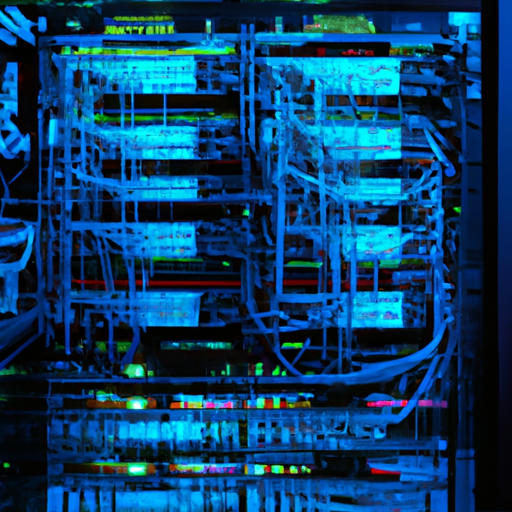How Do Managed IT Services Maintain Client Trust And Confidentiality?
In today’s rapidly evolving technological landscape, trust and confidentiality are of utmost importance for clients seeking managed IT services. With the ever-increasing threat of cyberattacks and data breaches, organizations are relying on managed IT services to safeguard their sensitive information. These services employ stringent security measures, such as encrypted data storage and regular system updates, to ensure the highest level of client trust and confidentiality. By partnering with a reputable managed IT services provider, clients can have peace of mind knowing that their information is handled with the utmost care and security.
Establishing Strong Security Measures
In today’s digital landscape, protecting sensitive information and ensuring the security of data is of utmost importance. Managed IT services play a crucial role in maintaining client trust and confidentiality by implementing strong security measures. Let’s explore some key strategies that managed IT service providers employ to ensure the security and integrity of their clients’ data.
Implementing Multi-factor Authentication
One of the most effective ways to enhance security is the implementation of multi-factor authentication (MFA). This layered approach to authentication adds an extra layer of protection by requiring users to provide two or more factors to verify their identities. These factors typically include something the user knows (such as a password), something they have (such as a physical token or smartphone), or something they are (such as biometric data). By implementing MFA, managed IT service providers can significantly reduce the risk of unauthorized access to sensitive systems and data.
Utilizing Encryption Techniques
Encryption technology plays a vital role in securing sensitive data. By using encryption algorithms, managed IT service providers ensure that data is transformed into an unreadable format when at rest or in transit. Even if intercepted by unauthorized individuals, encrypted data remains useless without the decryption key. Whether it’s encrypting data stored on servers or encrypting data transmitted between devices and networks, encryption is a powerful tool in safeguarding client information from unauthorized access.
Regularly Updating and Patching Systems
Keeping software and systems up to date is crucial for maintaining a secure IT infrastructure. Managed IT service providers diligently monitor and install software updates, patches, and security fixes on a regular basis. These updates often include essential security enhancements that address vulnerabilities and protect against new threats. By promptly addressing software vulnerabilities, managed IT service providers minimize the risk of data breaches and ensure that their clients’ systems remain secure.
Implementing Data Loss Prevention Measures
Data loss prevention (DLP) measures are designed to prevent the unauthorized disclosure of sensitive data. Managed IT service providers implement various technologies and policies to monitor, detect, and prevent data leakage. These measures include real-time monitoring of data flows, content filtering, and endpoint control. By effectively implementing DLP solutions, managed IT service providers can identify and block any attempts to access, transfer, or store confidential data in unauthorized ways, providing an additional layer of protection against data breaches.
Implementing Robust Firewall Systems
Firewalls serve as a crucial first line of defense against unauthorized access and network threats. Managed IT service providers employ robust firewall systems to protect their clients’ networks from external threats and ensure that only legitimate traffic is allowed. Let’s explore some key elements of implementing robust firewall systems.
Installing Dedicated Firewalls
Managed IT service providers install dedicated firewalls to provide enhanced network security. These hardware or software-based systems act as a network barrier by filtering incoming and outgoing network traffic based on predetermined rules. By deploying dedicated firewalls, managed IT service providers create a secure perimeter for their clients’ networks, effectively isolating internal network resources from potential threats.
Configuring Firewall Rules
Firewall rules determine how traffic is allowed or blocked within a network. Managed IT service providers configure firewall rules based on specific requirements and security policies. These rules define what type of traffic is permitted or denied based on factors such as source IP addresses, destination IP addresses, port numbers, and protocols. By carefully configuring firewall rules, managed IT service providers ensure that only authorized traffic is allowed, minimizing the risk of unauthorized access and malicious activities.
Implementing Intrusion Detection and Prevention Systems
Intrusion detection and prevention systems (IDPS) play a crucial role in network security by monitoring network traffic for suspicious behavior or patterns. Managed IT service providers implement IDPS solutions to detect and prevent unauthorized access attempts, malicious activities, and potential security breaches. By leveraging advanced algorithms and real-time monitoring, IDPS solutions can identify and respond to threats in a timely manner, providing an additional layer of protection against network-based attacks.
Providing Secure Remote Access Solutions
With the increasing need for remote work capabilities, managed IT service providers ensure secure and reliable remote access to client systems. Let’s explore some key solutions used by managed IT service providers to provide secure remote access.
Using Virtual Private Network (VPN) Technology
Virtual Private Networks (VPNs) create secure, encrypted tunnels between remote users and the client’s network. Managed IT service providers deploy VPN technology to enable secure remote access to client systems from any location. By encrypting all data transmitted between endpoints, VPNs ensure that sensitive information remains protected even when accessed from untrusted networks such as public Wi-Fi hotspots. VPNs add an extra layer of security by authenticating users and ensuring that only authorized individuals can establish a connection to the client’s network.
Implementing Secure Remote Desktop Protocol (RDP)
Secure Remote Desktop Protocol (RDP) allows users to remotely access desktops or servers securely. Managed IT service providers implement secure RDP solutions to enable seamless remote access to client systems while ensuring data security. By utilizing encryption and authentication protocols, RDP establishes a secure connection between the user’s device and the remote desktop or server, safeguarding sensitive information from unauthorized access.
Utilizing Two-Factor Authentication for Remote Access
To enhance the security of remote access solutions, managed IT service providers often implement two-factor authentication (2FA). Two-factor authentication requires users to provide two separate credentials to authenticate their identities. This typically involves combining something the user knows (such as a password) with something they have (such as a code or physical token). By implementing 2FA, managed IT service providers add an extra layer of protection to remote access, significantly reducing the risk of unauthorized access to client systems and data.
Implementing Strong Password Policies
Passwords serve as the first line of defense against unauthorized access to sensitive systems and accounts. Managed IT service providers enforce strong password policies to ensure that client passwords are secure and not easily susceptible to being compromised. Let’s explore some key elements of strong password policies.
Enforcing Complex Password Requirements
Managed IT service providers enforce complex password requirements to ensure that passwords are strong and difficult to guess. These requirements often include a minimum length, a combination of uppercase and lowercase letters, numbers, and special characters. By enforcing these requirements, managed IT service providers minimize the risk of password brute-force attacks and unauthorized access to client accounts.
Implementing Password Expiration Policies
Regularly changing passwords is essential for maintaining the security of client accounts. Managed IT service providers implement password expiration policies that require users to change their passwords at regular intervals. By periodically changing passwords, the risk of unauthorized access due to compromised passwords is significantly reduced. Additionally, password expiration policies prompt users to choose new passwords, maximizing the chances of selecting strong and unique passwords.
Educating Clients on Password Best Practices
Managed IT service providers understand the importance of educating clients on password best practices. They provide guidance and resources to help clients create strong and memorable passwords, avoid common password pitfalls, and protect their accounts from unauthorized access. By educating clients on password best practices, managed IT service providers empower them to play an active role in maintaining the security of their accounts and data.
Regularly Monitoring and Auditing Systems
Continuous monitoring and auditing of systems are essential components of strong security practices. Managed IT service providers employ various measures to detect and respond to security incidents, identify vulnerabilities, and ensure compliance with security policies. Let’s explore some key aspects of monitoring and auditing systems.
Implementing Security Information and Event Management (SIEM) Systems
Managed IT service providers implement Security Information and Event Management (SIEM) systems to aggregate, correlate, and analyze security event logs from various systems and applications. SIEM systems enable proactive monitoring of network traffic, system logs, and security events, enabling prompt identification of security incidents and anomalies. By centralizing security information and providing real-time alerts, SIEM systems enhance the ability to detect and respond to security threats effectively.
Performing Regular Security Audits and Assessments
Managed IT service providers conduct regular security audits and assessments to proactively identify vulnerabilities, evaluate security controls, and ensure compliance with industry standards and regulations. These audits often involve conducting penetration tests, vulnerability scans, and risk assessments to assess the overall security posture. By performing regular security audits and assessments, managed IT service providers can continuously improve security measures and address any identified weaknesses promptly.
Monitoring Network Traffic and System Logs
Continuous monitoring of network traffic and system logs is crucial for detecting and mitigating potential security threats. Managed IT service providers employ monitoring tools and technologies to capture and analyze network traffic, system logs, and event data. By closely monitoring network activity and system logs, managed IT service providers can identify any suspicious behavior, unauthorized access attempts, or potential security breaches. This proactive approach allows for timely response and mitigation, minimizing the impact of security incidents.
Conducting Employee Security Awareness Training
Employees are often the weakest link when it comes to cybersecurity. Managed IT service providers understand the importance of educating employees on potential security risks and best practices. Let’s explore some key aspects of conducting employee security awareness training.
Educating Employees on Phishing and Social Engineering Attacks
Phishing and social engineering attacks remain prevalent and pose significant threats to organizations. Managed IT service providers conduct training sessions to educate employees on how to recognize and respond to phishing emails, suspicious links, and social engineering tactics. By raising awareness about these common attack vectors, employees can become more vigilant and avoid falling victim to these scams, reducing the risk of unauthorized access and data breaches.
Promoting Good Cybersecurity Practices and Vigilance
Managed IT service providers promote good cybersecurity practices among employees to ensure that security remains a top priority. They provide guidance on topics such as password management, secure email usage, safe browsing habits, and the importance of regular software updates. By encouraging employees to be vigilant and practice good cybersecurity hygiene, managed IT service providers create a culture of security awareness and responsibility throughout the organization.
Testing and Assessing Employee Awareness and Understanding
To gauge the effectiveness of the security awareness training and identify areas for improvement, managed IT service providers conduct periodic tests and assessments. These assessments can take the form of simulated phishing campaigns or quizzes to evaluate how well employees retain and apply the knowledge gained from training sessions. By regularly testing and assessing employee awareness and understanding, managed IT service providers can continuously enhance the effectiveness of their security awareness programs.
Implementing Physical Security Measures
While digital security is paramount, physical security measures are equally important for protecting client data. Managed IT service providers employ various strategies to ensure the physical security of their data centers and server rooms.
Ensuring Physical Access Control to Data Centers and Server Rooms
Managed IT service providers implement strict physical access control measures to prevent unauthorized access to data centers and server rooms. This includes implementing secure entry systems, requiring employee identification badges, and employing biometric authentication methods where appropriate. By ensuring that only authorized personnel can access sensitive areas, managed IT service providers maintain a high level of physical security for their clients’ data.
Installing Surveillance Systems for Monitoring
Video surveillance systems are an integral part of physical security measures. Managed IT service providers install surveillance cameras in strategic locations within their facilities, including data centers and server rooms. These surveillance systems provide real-time monitoring and recording of activities, enhancing the overall security of the premises. In the event of any security incident or breach, recorded footage can serve as valuable evidence for investigation and resolution.
Implementing Visitor Access Control and Monitoring
Managed IT service providers implement visitor access control measures to track and monitor individuals entering their facilities. This includes requiring visitors to sign in and provide proper identification, issuing visitor badges, and escorting them while on the premises. By implementing visitor access control and monitoring, managed IT service providers minimize the risk of unauthorized individuals gaining access to their clients’ sensitive environments.
Performing Regular Data Backups
Data backups are crucial for disaster recovery and business continuity. Managed IT service providers ensure that their clients’ critical data is regularly backed up according to predefined schedules and retention policies. Let’s explore some key elements of performing regular data backups.
Implementing Automated Data Backup Solutions
Managed IT service providers utilize robust backup solutions to automate the backup process and ensure data integrity. These solutions often include features such as incremental backups and versioning, allowing for efficient storage utilization and easy restoration of specific file versions if needed. By implementing automated data backup solutions, managed IT service providers minimize the risk of data loss and ensure that critical information is safeguarded against accidental deletion, hardware failures, or other issues.
Regularly Testing Data Restoration Processes
Performing regular data backups is only one part of the equation; the ability to restore data effectively is equally important. Managed IT service providers conduct regular tests and drills to ensure that data restoration processes are working as intended. By regularly testing data restoration procedures, managed IT service providers can identify any potential issues or shortcomings and address them before an actual data loss event occurs.
Storing Backups in Offsite and Secure Locations
Managed IT service providers understand the importance of storing backups in secure offsite locations. By maintaining copies of backups in geographically separate and highly secure facilities, managed IT service providers ensure that critical data remains protected in case of a physical disaster or localized event that may affect the primary data center. Offsite data storage also provides an added layer of protection against theft, unauthorized access, or other local incidents that may compromise data integrity.
Adhering to Industry Compliance Standards
Compliance with government and industry-specific regulations is crucial for many businesses. Managed IT service providers have a thorough understanding of these compliance standards and ensure that their security measures align with the necessary requirements. Let’s explore some key aspects of adhering to industry compliance standards.
Following Government and Industry-specific Regulations
Managed IT service providers stay up to date with the latest government regulations and industry-specific requirements. These regulations may include data protection laws, privacy regulations, financial regulations, or healthcare-related standards such as HIPAA. By understanding and adhering to these regulations, managed IT service providers ensure that their clients’ security measures comply with relevant legal and industry obligations.
Implementing Security Controls to Meet Compliance Requirements
To meet compliance requirements, managed IT service providers implement specific security controls and measures. These controls may include access control mechanisms, data encryption, audit logging, and incident response procedures, among others. By implementing the necessary security controls, managed IT service providers demonstrate their commitment to protecting sensitive information and maintaining compliance with legal and industry guidelines.
Conducting Regular Compliance Audits
To ensure ongoing compliance, managed IT service providers conduct regular compliance audits. These audits assess the effectiveness and adherence to security controls, evaluate the overall security posture, and identify any potential areas of non-compliance. By conducting regular compliance audits, managed IT service providers can proactively address any deficiencies and ensure that their clients’ security measures align with the required standards.
Maintaining Client Confidentiality
Maintaining client confidentiality is a top priority for managed IT service providers. Client trust is crucial for long-term relationships, and ensuring the privacy and confidentiality of client data is paramount. Let’s explore some key elements of maintaining client confidentiality.
Signing Non-Disclosure Agreements
Managed IT service providers understand the importance of non-disclosure agreements (NDAs) when handling sensitive client information. An NDA is a legal contract that establishes confidentiality obligations between parties. Managed IT service providers sign NDAs with their clients, affirming their commitment to maintaining the confidentiality of client data and preventing unauthorized disclosure.
Implementing Privacy Policies and Procedures
Managed IT service providers develop and implement comprehensive privacy policies and procedures. These policies outline how client data is handled, who has access to it, and the steps taken to protect its confidentiality. By implementing privacy policies and procedures, managed IT service providers ensure that client data is treated with the utmost care and only used for authorized purposes.
Establishing Strict Access Controls to Client Data
Managed IT service providers implement strict access controls to ensure that only authorized individuals can access client data. This includes implementing role-based access control (RBAC), where access privileges are granted based on job responsibilities and assigned roles. By implementing strong access controls, managed IT service providers minimize the risk of unauthorized access to client data, ensuring its confidentiality and integrity.
In conclusion, managed IT service providers play a vital role in maintaining client trust and confidentiality by implementing robust security measures. From multi-factor authentication and encryption techniques to secure remote access solutions and strong password policies, every aspect of security is carefully considered. By regularly monitoring systems, conducting employee security awareness training, and adhering to industry compliance standards, managed IT service providers consistently strive to protect client data and maintain confidentiality. With the implementation of physical security measures, regular data backups, and the utmost commitment to privacy, managed IT service providers ensure that their clients can have confidence in the security of their sensitive information.








